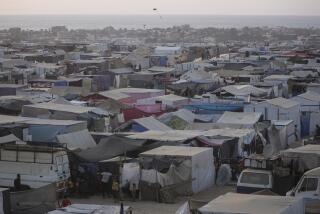U.S. Forces Destroy Arms, Vehicles of Somali Warlord : Africa: Americans say they intervened just to enforce cease-fire. Red Cross office is shelled in Kismayu.
MOGADISHU, Somalia â Enforcing this shattered African nationâs cease-fire with rockets and machine guns, U.S. helicopters on Monday swooped down and destroyed the vehicles and artillery of a warlord besieging a nomad camp, officials said.
The use of four Army Cobras was among the first interventions by U.S. forces to aid one of Somaliaâs rival clan-based factions during a battle. But American officials maintained they acted solely to enforce the cease-fire.
Relief workers, meanwhile, reported alarming news from Kismayu, the ultimate destination of the fighters targeted by the American choppers, including heavy shelling that riddled the roof of the International Committee of the Red Cross office with shrapnel.
A truck convoy trying to leave Kismayuâs port with food for famine-affected areas of southern Somalia was forced to return to the docks because of gunfire, Red Cross spokeswoman Nina Winquist said in Mogadishu.
A total of 42 Somalis were admitted to hospitals in Kismayu throughout the day with injuries due to âfighting and shelling,â she said, but she had no more information.
In a further indication of how uncertain this countryâs politics and security remain a month and a half after a large-scale injection of American troops, the leader of one of the most powerful of Somaliaâs rival bands, Mohammed Farah Aidid, claimed that although he was observing provisions of a cease-fire declared Jan. 15, some of his foes were not.
Aidid leveled the most severe accusations against Mohamed Siad Hirsi, known as Gen. Morgan, whom he charged with carrying out âattacks and atrocitiesâ in two southern regions with the alleged logistic support of Kenya, Somaliaâs southern neighbor.
Marine Col. Fred Peck, U.S. forces spokesman here, said Morganâs men had been attacking a camp about 25 miles west of Kismayu that was filled with forces loyal to Omar Jess, another rival who has been adhering to the terms of the cease-fire and confining his military weaponry to camps. Aidid claimed that his backers lived there.
Morgan--son-in-law of deposed President Mohamed Siad Barre, who fled the country two years ago today leaving chaos and anarchy behind--was warned by radio on Sunday by U.S.-led forces to stop the assault and pull back about 20 miles, Peck said.
The warning was repeated Monday. When it went unheeded, the Cobras struck at about 10 a.m., firing on Morganâs heaviest weaponry with 2.75-inch rockets and 20-millimeter machine guns as Belgian paratroopers fired from Scimitar armored vehicles on the ground, Peck said. The Americans and Belgians reported they destroyed six armored jeeps, a Soviet-made rocket launcher, an armored personnel carrier and four artillery pieces.
âTo the best of my knowledge, this caused the forces of Gen. Morgan to stop their advance on Kismayu and withdraw,â Peck said.
All eight helicopter crewmen from the 10th Mountain Division, based in Ft. Drum, N.Y., returned safely, although the fuselage of one chopper was riddled with small arms fire, showing that at least some of the Somalis fought back, Peck said. The Belgians reported no injuries.
Seven hours after the attack, Peck said he still had no information on casualties taken by Morganâs fighters.
American forces who have been in Somalia under Operation Restore Hope since Dec. 9 have been painstakingly trying to avoid siding with any of the countryâs bewildering array of factions.
At Aididâs news conference, held in the former Agriculture Ministryâs walled compound in Mogadishu shortly before the helicopter attack, the Mogadishu-based warlord said he had asked the Americans for help in stopping Morganâs advance.
A U.S. diplomat here who spoke on condition he not be identified said Morgan was made to understand in the warning message that American officials âfeel very stronglyâ about the cease-fire being adhered to by all.
Asked to explain the rationale of the attack, Peck said American forces intervened because Jess had been adhering to the agreement signed by rival Somali leaders, while Morgan had not.
The potential touchiness of Somali opinion over the presence of more than 38,000 foreign soldiers, sailors and airmen in the country, and the dangers of the outsiders being perceived as favorable to one faction, have been highlighted by recent unrest in Kismayu. There, witnesses said, several hundred Somalis demonstrated over the weekend to protest the presence of the 22-member U.S.-led coalition.
Protesters reportedly converged on the port area manned by Belgian soldiers, threw rocks and shouted, âOut, out!â
In the city 250 miles southwest of Mogadishu, 10 grenade attacks have occurred over the last 14 days, Peck said.
More to Read
Sign up for Essential California
The most important California stories and recommendations in your inbox every morning.
You may occasionally receive promotional content from the Los Angeles Times.










